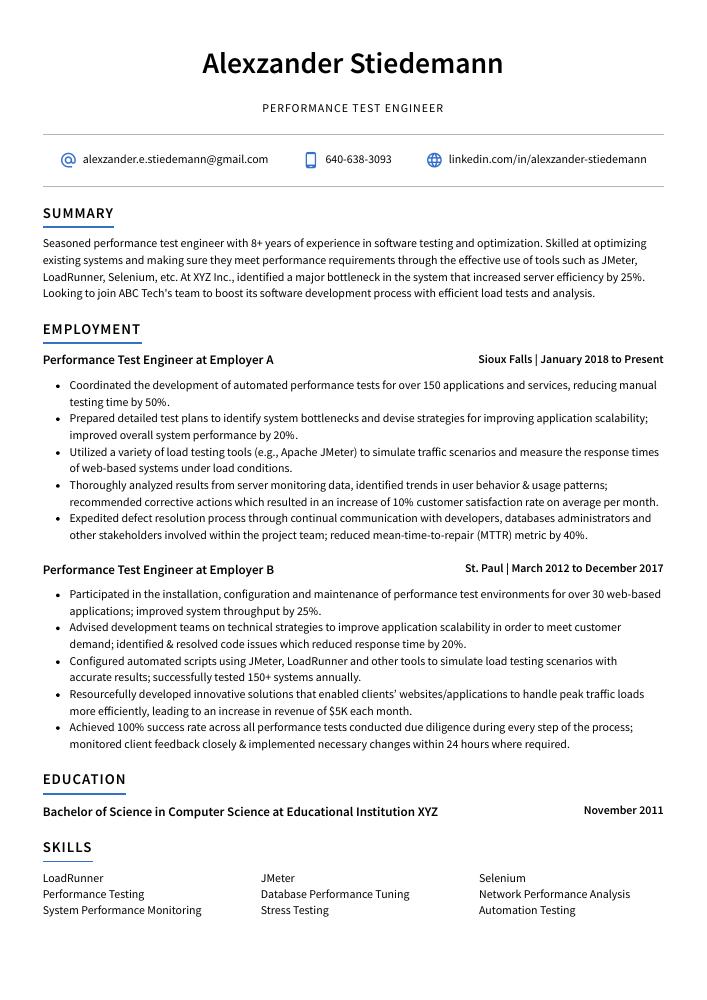Performance Test Engineer Resume Guide
Performance Test Engineers are responsible for ensuring that software applications perform as expected. They design, develop and execute tests to identify any issues with the performance of an application before it is released into production. Performance test engineers measure system resource utilization, response times and reliability of applications under varying workloads in order to ensure high-quality results for users.
You possess the technical and analytical skills to test any product in a jiffy. But hiring managers don’t know your capabilities, so you need to write a resume that conveys your experience as an excellent performance test engineer.
This guide will walk you through the entire process of creating a top-notch resume. We first show you a complete example and then break down what each resume section should look like.
Table of Contents
The guide is divided into sections for your convenience. You can read it from beginning to end or use the table of contents below to jump to a specific part.
Performance Test Engineer Resume Sample
Alexzander Stiedemann
Performance Test Engineer
alexzander.e.stiedemann@gmail.com
640-638-3093
linkedin.com/in/alexzander-stiedemann
Summary
Seasoned performance test engineer with 8+ years of experience in software testing and optimization. Skilled at optimizing existing systems and making sure they meet performance requirements through the effective use of tools such as JMeter, LoadRunner, Selenium, etc. At XYZ Inc., identified a major bottleneck in the system that increased server efficiency by 25%. Looking to join ABC Tech’s team to boost its software development process with efficient load tests and analysis.
Experience
Performance Test Engineer, Employer A
Sioux Falls, Jan 2018 – Present
- Coordinated the development of automated performance tests for over 150 applications and services, reducing manual testing time by 50%.
- Prepared detailed test plans to identify system bottlenecks and devise strategies for improving application scalability; improved overall system performance by 20%.
- Utilized a variety of load testing tools (e.g., Apache JMeter) to simulate traffic scenarios and measure the response times of web-based systems under load conditions.
- Thoroughly analyzed results from server monitoring data, identified trends in user behavior & usage patterns; recommended corrective actions which resulted in an increase of 10% customer satisfaction rate on average per month.
- Expedited defect resolution process through continual communication with developers, databases administrators and other stakeholders involved within the project team; reduced mean-time-to-repair (MTTR) metric by 40%.
Performance Test Engineer, Employer B
St. Paul, Mar 2012 – Dec 2017
- Participated in the installation, configuration and maintenance of performance test environments for over 30 web-based applications; improved system throughput by 25%.
- Advised development teams on technical strategies to improve application scalability in order to meet customer demand; identified & resolved code issues which reduced response time by 20%.
- Configured automated scripts using JMeter, LoadRunner and other tools to simulate load testing scenarios with accurate results; successfully tested 150+ systems annually.
- Resourcefully developed innovative solutions that enabled clients’ websites/applications to handle peak traffic loads more efficiently, leading to an increase in revenue of $5K each month.
- Achieved 100% success rate across all performance tests conducted due diligence during every step of the process; monitored client feedback closely & implemented necessary changes within 24 hours where required.
Skills
- LoadRunner
- JMeter
- Selenium
- Performance Testing
- Database Performance Tuning
- Network Performance Analysis
- System Performance Monitoring
- Stress Testing
- Automation Testing
Education
Bachelor of Science in Computer Science
Educational Institution XYZ
Nov 2011
Certifications
Certified Performance Engineering Professional
International Software Testing Qualifications Board
May 2017
1. Summary / Objective
A resume summary/objective is your chance to make a great first impression on the hiring manager. As a performance test engineer, you can use this section of your resume to highlight the technical skills and experience that make you stand out from other applicants. For example, mention any certifications or qualifications related to performance testing that you possess, as well as any software tools and languages with which you are familiar. Additionally, include information about how many projects/tests have been successfully completed in the past and what results were achieved.
Below are some resume summary examples:
Passionate performance test engineer with 6+ years of experience in testing and analyzing system performance. Expertise in developing tests to ensure that applications meet customer requirements, scalability guidelines, and industry-standard best practices. At XYZ Technologies, reduced software load time by 15% while maintaining 99% uptime for the entire system. Seeking a role at ABC Tech where I can leverage my skills to optimize application performance.
Diligent performance test engineer with 5+ years of experience in performance testing and optimization. Skilled at identifying, designing, and executing performance tests for enterprise-level applications using industry best practices. Experienced in multiple programming languages including Java and Python. At XYZ Inc., was instrumental in boosting server throughput by 40% through the implementation of effective load testing strategies.
Amicable performance test engineer with 5+ years of experience in designing, developing, and executing performance tests for software applications. At XYZ Corporation, led a team of 10 to successfully improve the loading time by 40% on multiple webpages using automated scripts. Experienced in various performance testing tools such as HP LoadRunner and JMeter to identify system bottlenecks and memory leaks from application servers.
Proficient performance test engineer with 7+ years of experience in designing, developing and executing performance tests for web applications. At XYZ, successfully lead a team to develop an automated framework which increased the speed of execution by 50%. Adept at identifying bottlenecks in code or system design that can cause application slowdowns. Highly experienced in various testing tools such as JMeter and LoadRunner.
Talented performance test engineer with 5+ years of experience in developing, executing, and analyzing performance tests for various web-based applications. In previous roles, successfully reduced page load time by 17% while improving overall user satisfaction rate by 33%. Eager to join ABC Tech as a Performance Test Engineer and utilize cutting-edge testing techniques to ensure the highest level of quality assurance.
Enthusiastic performance test engineer with 8+ years of experience in creating and automating performance tests for web-based applications. Skilled at using various tools such as JMeter, LoadRunner, Selenium to create comprehensive load testing plans. Proven track record in identifying the root cause of application performance issues and implementing solutions that improve user experience.
Hard-working performance test engineer with 6+ years of experience in creating, executing, and analyzing software performance tests. Seeking to join ABC Tech where I can apply my knowledge of scripting languages and server-side technologies to help deliver reliable solutions for their customers. At XYZ Corp., reduced system response time by 15% while improving overall uptime by 20%.
Well-rounded performance test engineer with 5+ years of experience crafting and executing performance tests to deliver reliable, secure software systems. Seeking to join ABC Tech in order to apply technical expertise and problem-solving skills for the benefit of its clients. At XYZ, conducted numerous load stress tests resulting in a 30% improvement in system speed and stability.
2. Experience / Employment
The work history/experience section is where you provide details on your previous roles. This should be written in reverse chronological order, with your most recent job listed first.
Stick to bullet points when writing this section; it makes the information easier for the reader to digest quickly. When stating what you did, make sure that each point provides detail and quantifiable results if possible. For example, instead of saying “Conducted performance tests,” you could say, “Performed load testing on software applications using JMeter which revealed a 10% increase in system stability.”
To write effective bullet points, begin with a strong verb or adverb. Industry specific verbs to use are:
- Monitored
- Evaluated
- Analyzed
- Designed
- Executed
- Automated
- Troubleshot
- Optimized
- Documented
- Implemented
- Configured
- Scheduled
- Tested
- Debugged
Other general verbs you can use are:
- Achieved
- Advised
- Assessed
- Compiled
- Coordinated
- Demonstrated
- Developed
- Expedited
- Facilitated
- Formulated
- Improved
- Introduced
- Mentored
- Participated
- Prepared
- Presented
- Reduced
- Reorganized
- Represented
- Revised
- Spearheaded
- Streamlined
- Structured
- Utilized
Below are some example bullet points:
- Reduced the time needed to execute performance tests by 30%, optimizing the overall test cycle process and resulting in a $12,000 savings.
- Documented detailed results of performance tests across multiple platforms; identified and resolved issues related to system stress, scalability & latency within deadlines.
- Tested software applications for memory leaks using various automated tools; prepared reports with recommendations on solutions for improved performance efficiency & user experience.
- Actively monitored server health & resource utilization during load testing processes; minimized downtimes by troubleshooting application-level problems that could impact production environment stability.
- Introduced new tools in collaboration with development teams to improve automation capabilities around regression tests as well as end-to-end monitoring activities of existing systems infrastructure setup.
- Successfully developed and implemented over 600 performance tests for a range of web-based applications, identifying potential issues in software code before they became problems.
- Improved system performance by 25% through rigorous testing processes which identified opportunities to optimize existing database queries and reduce memory usage.
- Analyzed test results to identify trends and recommend solutions that would improve the overall user experience; resulting in an increase of customer satisfaction ratings by 20%.
- Structured comprehensive test plans based on industry best practices for various applications covering functionality, scalability, reliability, usability and security requirements with an error rate below 1%.
- Implemented automated monitoring tools to assess the ongoing health of systems under load conditions; reduced manual effort required for diagnostics from 10 hours down to 2 hours per week.
- Troubleshot and debugged software performance issues, improved system response times by 25% and reduced downtime rate by 30%.
- Monitored application behavior during peak usage periods to identify any latency or functionality problems; proactively identified 50+ bugs before they affected user experience.
- Diligently documented test results in a detailed report for the development team, helping them resolve complex technical challenges with more efficiency and accuracy.
- Demonstrated strong analytical skills when identifying performance bottlenecks & developing automated tests to validate product features prior to launch; lowered QA time by 45 hours per month on average.
- Developed comprehensive test plans & scripts using Python/JavaScript for both manual & automated testing scenarios on web-based applications; raised defect detection rate from 20% – 90%.
- Executed performance tests on over 50 applications, ensuring optimal system performance and stability; reduced customer response time by 25% with the successful implementation of best practices.
- Facilitated regular testing meetings to discuss test strategies, approaches and outcomes; identified & documented more than 10 issues found during usability/performance testing sessions.
- Represented the engineering team in customer feedback sessions to explain data collected from various types of stress tests; recorded a 100% success rate for all projects conducted in 2020-21 fiscal year period.
- Proficiently utilized manual & automation tools such as JMeter, LoadRunner and Selenium WebDriver to measure application responsiveness under varying load conditions while keeping maintenance costs within budget limits (+20%).
- Scheduled periodic functionalities reviews using standard quality assurance protocols that resulted in improved web development processes across multiple sites (over 80%) with minimal downtimes reported each month.
- Competently designed and executed over 500 performance tests with up to 70 concurrent users on web, mobile and desktop applications; improved overall system efficiency by 40%.
- Streamlined the entire process of creating test cases for new releases, resulting in a 75% reduction in testing time required per project.
- Compiled detailed reports highlighting key metrics such as page load times, response times and memory usage; identified areas for improvement which resulted in an increase of 10% user satisfaction ratings.
- Formulated comprehensive plans to ensure that all software updates were thoroughly tested prior to deployment; saved 300+ hours of manual labor costs over the course of six months due to increased automation levels achieved through this process.
- Presented findings from each test cycle alongside strategies for improving system stability & user experience at monthly technical meetings attended by stakeholders across multiple departments within the organization.
- Automated performance tests for over 200 web-based applications, resulting in an average 25% decrease in manual testing time.
- Developed and implemented various performance test strategies to monitor application loads, stability & scalability; identified a total of 35 optimization opportunities that improved user experience by up to 40%.
- Consistently monitored the effectiveness of performance tests using advanced analytics tools such as Splunk and Dynatrace; reduced response times by 17% on average within 6 months.
- Designed customized scripts utilizing scripting languages like Java, Python or JavaScript to analyze system latency under different conditions while also ensuring accuracy of results with simulated data sets; increased quality assurance efficiency by 20%.
- Assessed overall system health across multiple platforms via automated monitoring systems like AppDynamics – reported any anomalies or issues promptly which minimized downtime from 2 hours/week to 0 hour/week on average.
- Confidently developed and executed performance test plans for over 20 applications, resulting in a reduction of 80% of system outages.
- Spearheaded the automation process for testing web-based services and mobile apps; successfully improved client satisfaction by 24%.
- Evaluated application performance to identify bottlenecks, memory leaks and other issues which could potentially affect user experience; identified an average of four problems per week with accuracy rates exceeding 95%.
- Reorganized existing infrastructure architecture to optimize performance tests across multiple platforms while reducing resources needed by 30%; saved $2,500 on hardware costs annually as a result.
- Revised scripts used for load & stress testing using Python/JavaScript based frameworks such as Selenium WebDriver/Jenkins etc., raising efficiency ratings from 68% – 90% within 3 months’ time frame.
3. Skills
Skill requirements will differ from employer to employer – this can easily be determined via the job advert. Organization ABC might be looking for someone with experience in JMeter, while Organization XYZ might require a candidate to have knowledge of LoadRunner.
It is essential to tailor the skills section of your resume for each job you are applying for because many employers use applicant tracking systems these days, which scan resumes and CVs for certain keywords before passing them on to a human.
In addition to listing relevant technical skills here, it would also be beneficial if you elaborated on some of the most important ones in other sections such as the summary or work experience area.
Below is a list of common skills & terms:
- Automation Testing
- Cloud Performance Testing
- Database Performance Tuning
- JMeter
- LoadRunner
- Network Performance Analysis
- Performance Testing
- Selenium
- Stress Testing
- System Performance Monitoring
4. Education
Including an education section on your resume will depend on how far along you are in your career. If you just graduated and have no work experience, mention the relevant courses and subjects that pertain to the performance test engineer job below your resume objective. However, if you have several years of experience working as a performance test engineer at multiple companies with plenty of responsibilities to showcase, omitting an education section is perfectly fine.
If including an education section, make sure to list any courses or projects related specifically to software testing engineering since this will demonstrate technical knowledge and skills relevant for the position.
Bachelor of Science in Computer Science
Educational Institution XYZ
Nov 2011
5. Certifications
Certifications demonstrate to potential employers that you have the skills and knowledge necessary for a particular job. Showing certifications on your resume can help set you apart from other applicants, as it shows that you are committed to staying up-to-date in your field.
If there is an industry certification related to the position you’re applying for, make sure to include it in this section of your resume so hiring managers know about it right away.
Certified Performance Engineering Professional
International Software Testing Qualifications Board
May 2017
6. Contact Info
Your name should be the first thing a reader sees when viewing your resume, so ensure its positioning is prominent. Your phone number should be written in the most commonly used format in your country/city/state, and your email address should be professional.
You can also choose to include a link to your LinkedIn profile, personal website, or other online platforms relevant to your industry.
Finally, name your resume file appropriately to help hiring managers; for Alexzander Stiedemann, this would be Alexzander-Stiedemann-resume.pdf or Alexzander-Stiedemann-resume.docx.
7. Cover Letter
Submitting a cover letter with your job application is an excellent way to make a great first impression. It allows you to provide more detail about yourself, explain why you think you’re the best candidate for the role and give insight into who you are as a person.
Cover letters should be kept between 2-4 paragraphs in length and should include information that isn’t already mentioned on your resume. Whilst they aren’t always necessary when applying for jobs, it’s recommended that applicants write one if possible – especially if there is stiff competition for the position!
Below is an example cover letter:
Dear Reanna,
I am writing to apply for the Performance Test Engineer position at XYZ Corporation. I am a highly skilled and experienced software engineer with over 10 years of experience in performance testing, load testing, and stress testing of web applications.
I have extensive experience working with various tools and technologies such as JMeter, LoadRunner, WebLoad, NeoLoad, AppDynamics, Dynatrace, New Relic APM, Splunk Enterprise Edition (EE), and Site24x7. I am also well-versed in multiple programming languages such as Java/J2EE,. NET Framework 4.5+, C# 6+, Python 3+, PHP 7+, Node. Js 8+, Ruby 2+, Perl 5+ etc. In addition to this, I have also worked with databases such as MySQL 5.6/5.7/8.0+, MongoDB 3+.
I possess strong analytical skills and have the ability to think out of the box to come up with innovative solutions to complex problems. I am an excellent communicator and have superb interpersonal skills which enable me to work effectively in team environments as well as independently when required.
Please find attached my resume for your perusal along with this letter.
Sincerely,
Alexzander
Performance Test Engineer Resume Templates
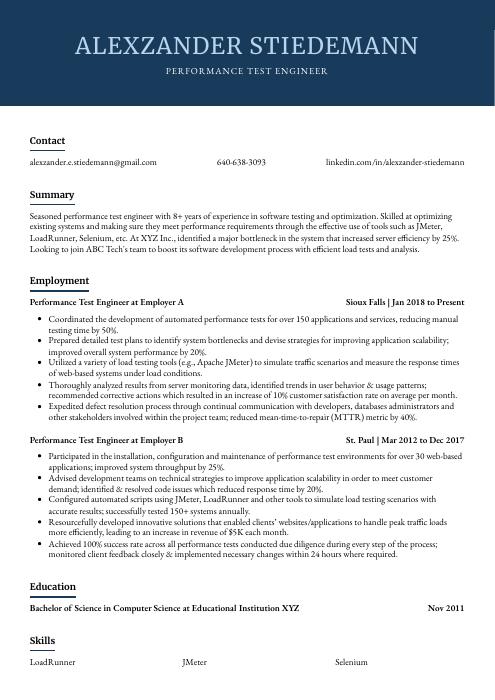 Bonobo
Bonobo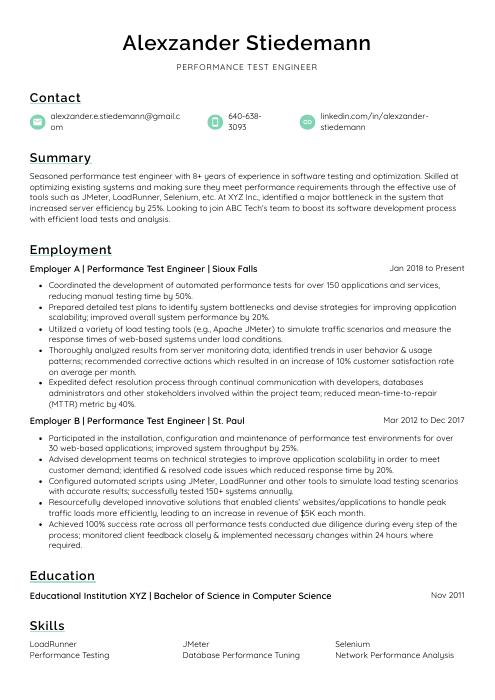 Lorikeet
Lorikeet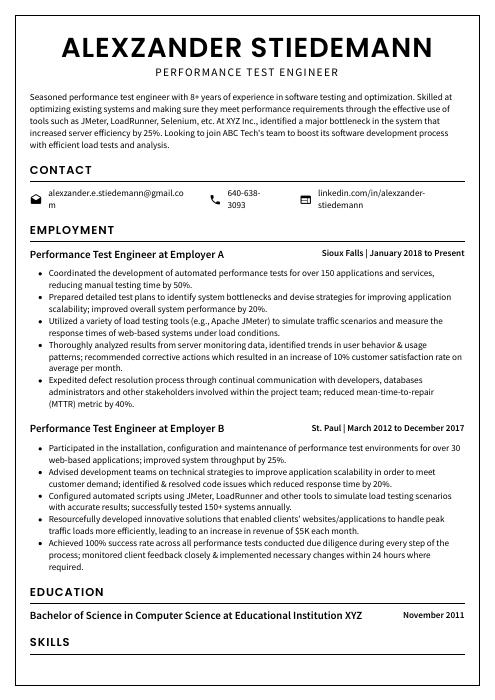 Cormorant
Cormorant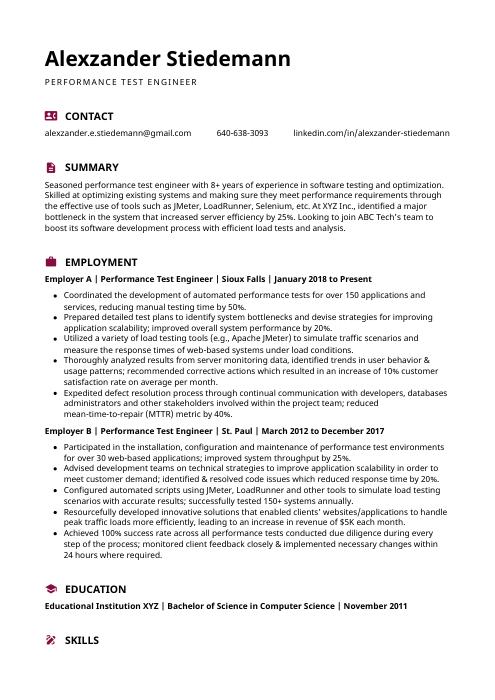 Hoopoe
Hoopoe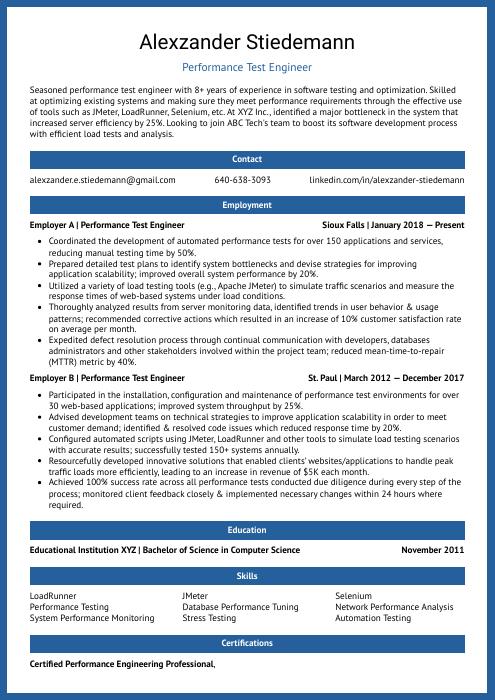 Ocelot
Ocelot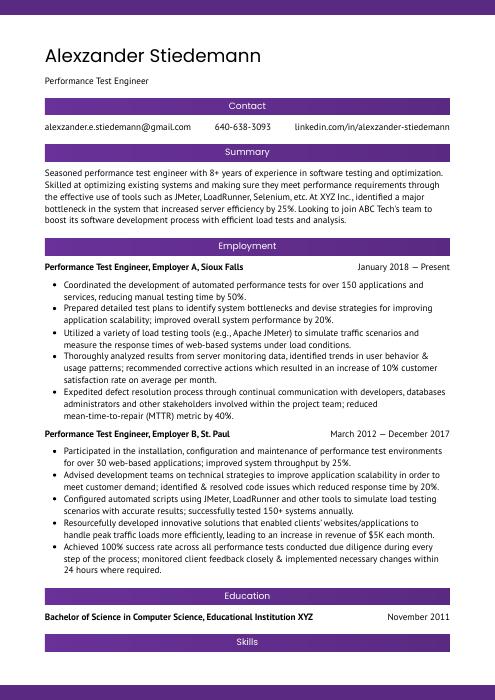 Jerboa
Jerboa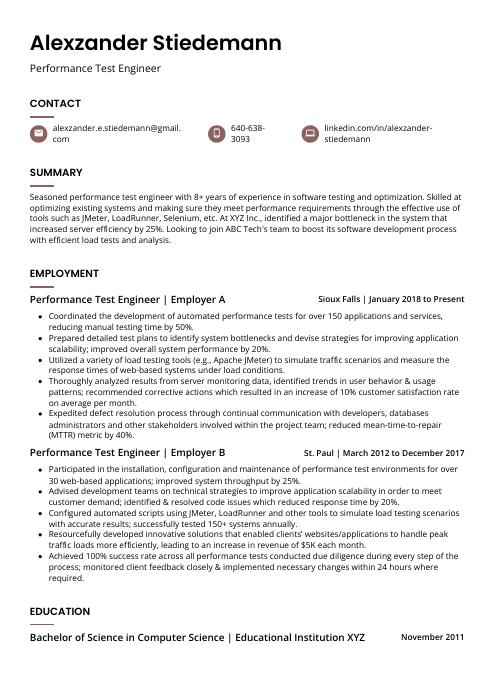 Fossa
Fossa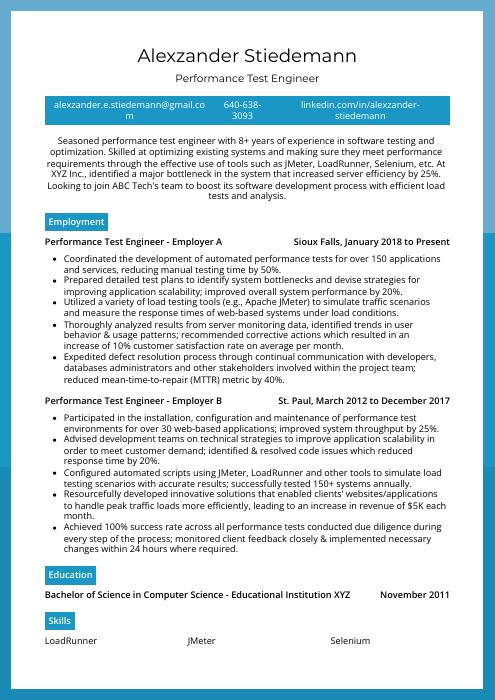 Rhea
Rhea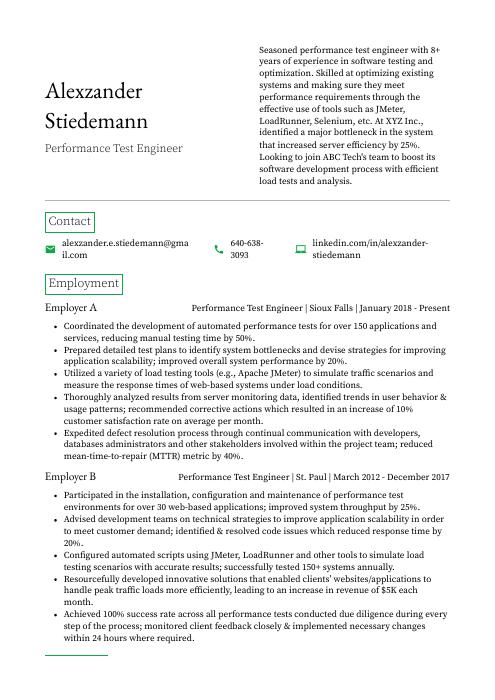 Quokka
Quokka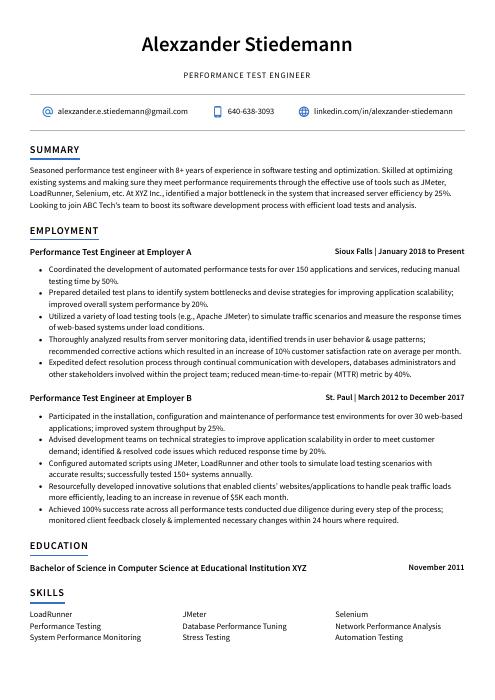 Axolotl
Axolotl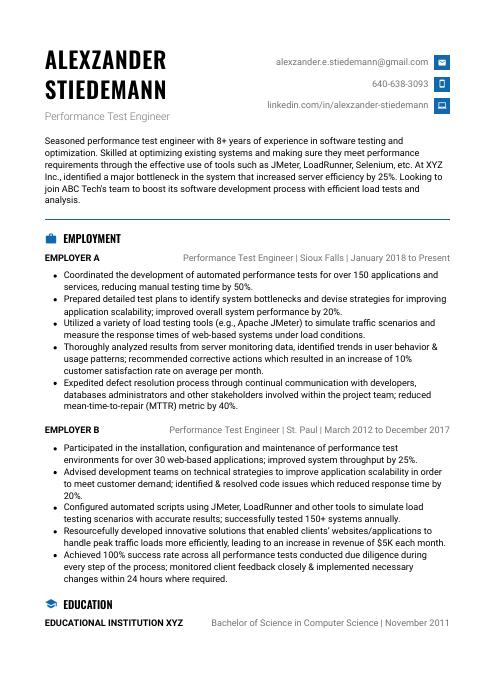 Echidna
Echidna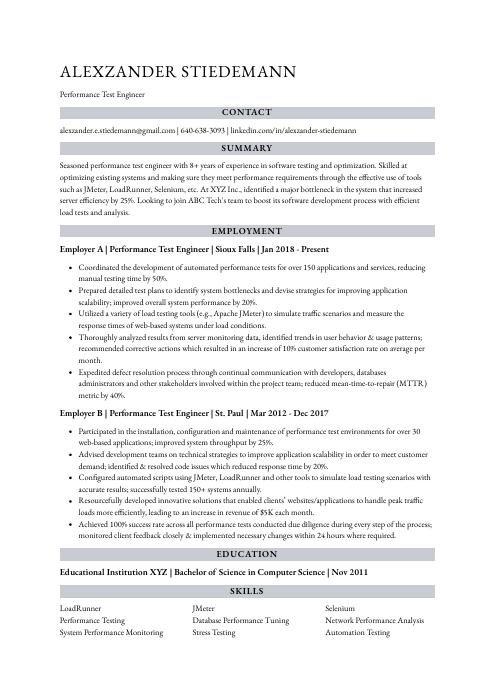 Numbat
Numbat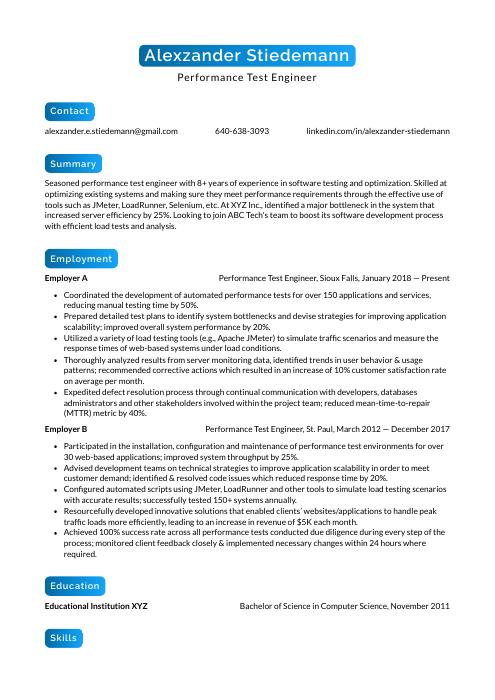 Kinkajou
Kinkajou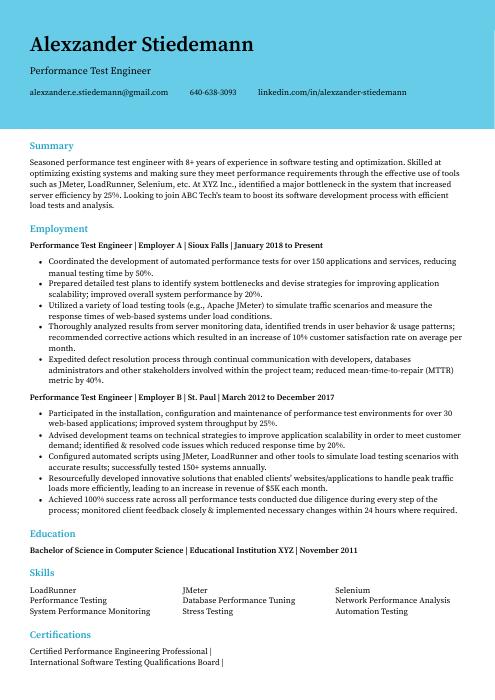 Dugong
Dugong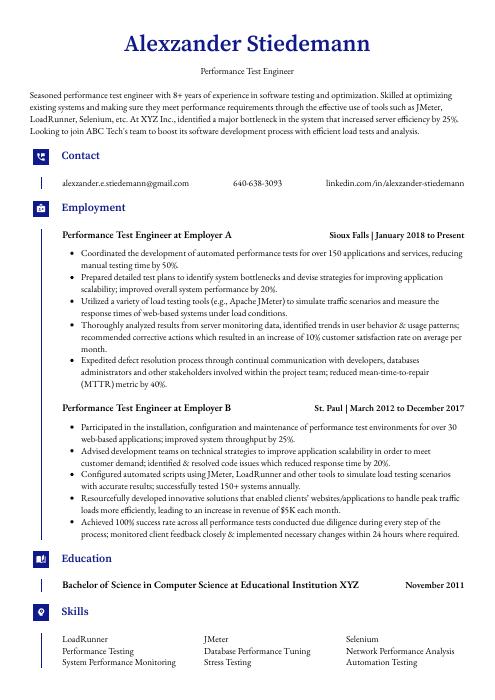 Gharial
Gharial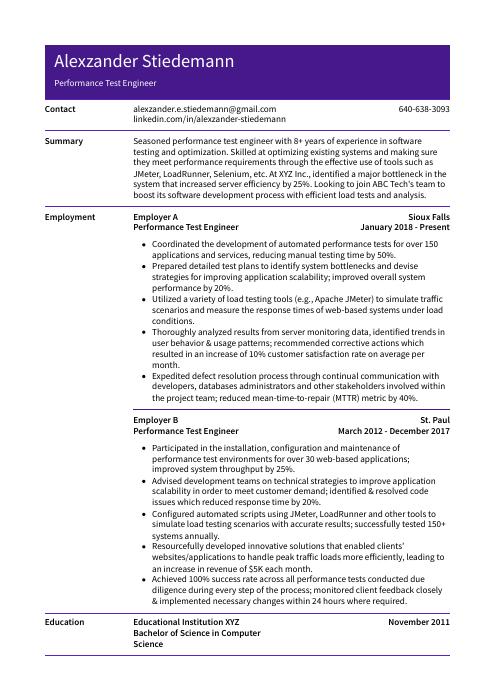 Pika
Pika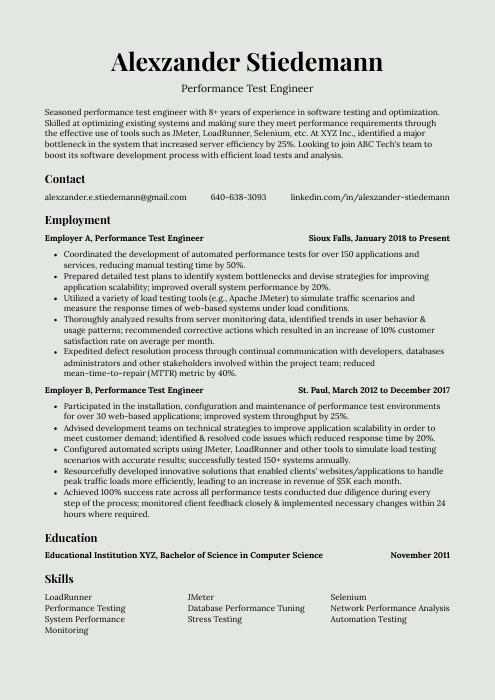 Saola
Saola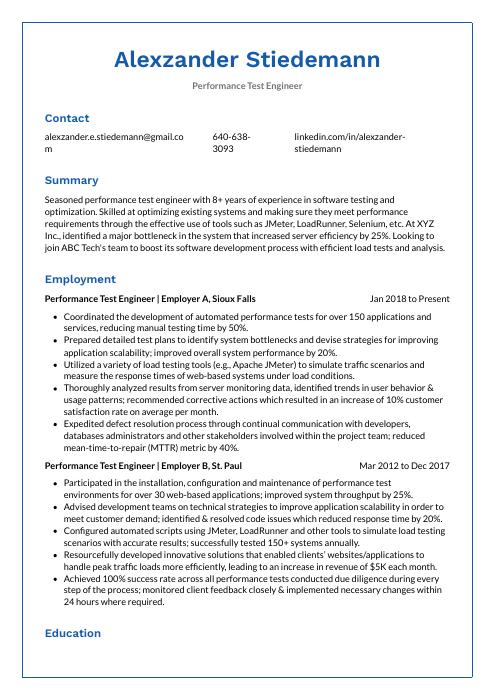 Markhor
Markhor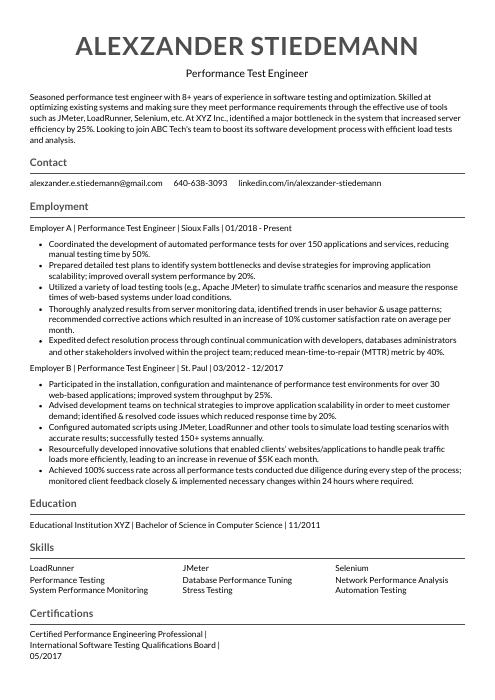 Indri
Indri Rezjumei
Rezjumei
